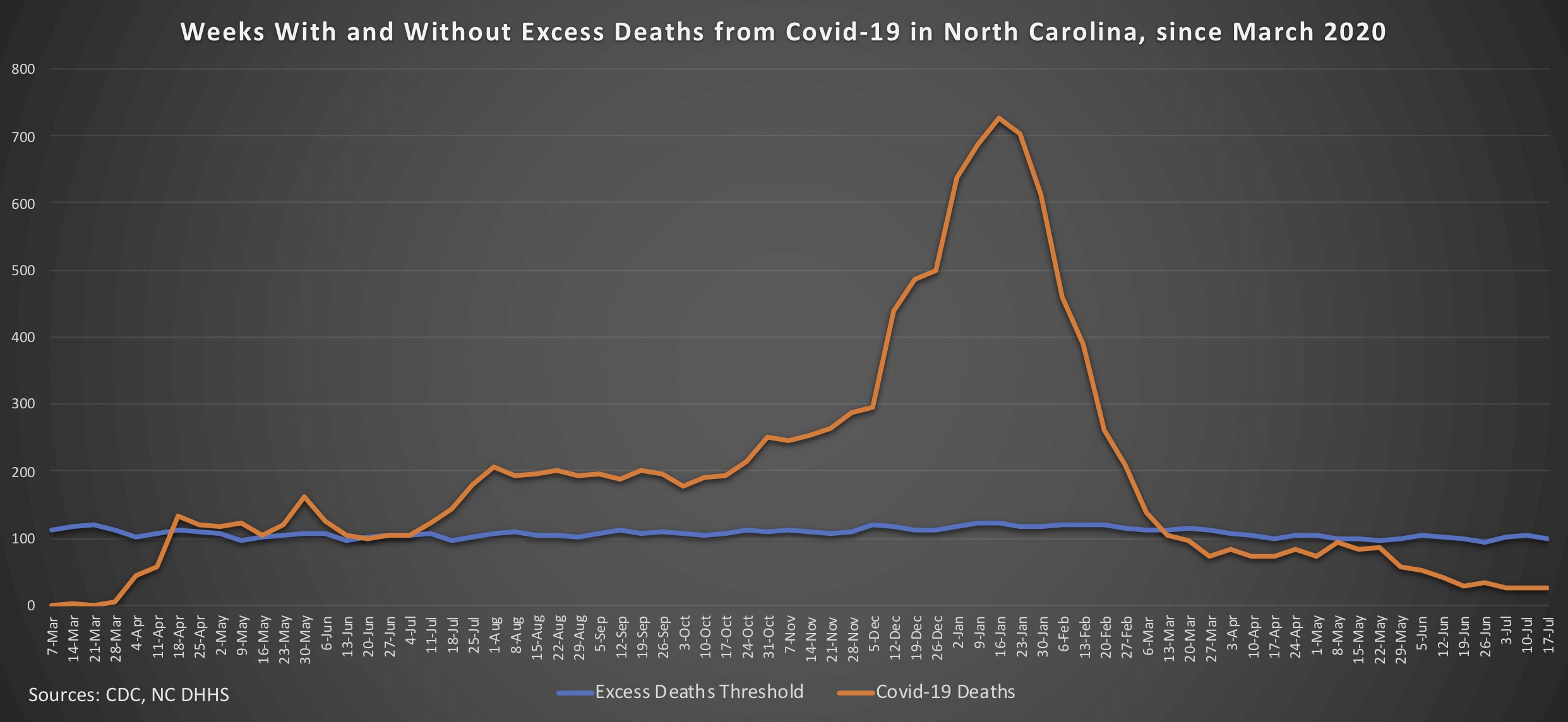Earlier this spring I wrote about how our leaders, including Pres. Joe Biden and Gov. Roy Cooper, “need the humility of Canute.” That means understanding that “the forces of nature obey their Creator, not a man who is elevated to rule over other men, but who is still a man.”
Yesterday’s Research Brief showed that, despite the delta variant, North Carolina hasn’t had excess deaths from Covid-19 since mid-March. I wrote that “vaccine-induced and natural immunity are now factoring in — bringing about what experts call the ‘decoupling‘ between infections and severe illness and death.”

Also yesterday, Gov. Roy Cooper told North Carolinians that “This virus is now much more contagious and spreading fast and it will find you if you’re unvaccinated,” and his fellow non-Canute, state health bureaucrat Mandy Cohen, said “We really are worried that this delta variant is going to find everyone who’s not protected.”
My brief touched on the delta variant, noting something we’re not hearing in our local media: “the delta variant is already showing signs of having peaked in the states hardest hit by it, as well as the United Kingdom, India, and other affected regions.”
Today’s New York Times discusses “More Covid Mysteries,” which include:
In India — where the Delta variant was first identified and caused a huge outbreak — cases have plunged over the past two months. A similar drop may now be underway in Britain. There is no clear explanation for these declines.
In the U.S., cases started falling rapidly in early January. The decline began before vaccination was widespread and did not follow any evident changes in Americans’ Covid attitudes.
In March and April, the Alpha variant helped cause a sharp rise in cases in the upper Midwest and Canada. That outbreak seemed poised to spread to the rest of North America — but did not.
This spring, caseloads were not consistently higher in parts of the U.S. that had relaxed masking and social distancing measures (like Florida and Texas) than in regions that remained vigilant.
What are we to make of all this? The Times counsels … humility:
Michael Osterholm, who runs an infectious disease research center at the University of Minnesota, suggests that people keep in mind one overriding idea: humility.
“We’ve ascribed far too much human authority over the virus,” he told me. …
But much of the ebb and flow of a pandemic cannot be explained by changes in human behavior. That was true with influenza a century ago, and it is true with Covid now. An outbreak often fizzles mysteriously, like a forest fire that fails to jump from one patch of trees to another.
An idea that wouldn’t occur to people before 2020 surprises many now: a virus doesn’t obey government edicts. The Times:
A more plausible explanation appears to be that Delta spreads very quickly at first and, for some unknown set of reasons, peters out long before a society has reached herd immunity. As Andy Slavitt, a former Covid adviser to President Biden, told me, “It seems to rip through really fast and infect the people it’s going to infect.” The most counterintuitive idea here is that an outbreak can fade even though many people remain vulnerable to Covid.
That’s not guaranteed to happen everywhere, and there probably will be more variants after Delta. Remember: Covid behaves in mysterious ways. But Americans should not assume that Delta is destined to cause months of rising caseloads. Nor should they assume that a sudden decline, if one starts this summer, fits a tidy narrative that attributes the turnaround to rising vaccination and mask wearing.
“These surges have little to do with what humans do,” Osterholm argues. “Only recently, with vaccines, have we begun to have a real impact.” …
Osterholm’s plea for humility does have policy implications. It argues for prioritizing vaccination over every other strategy. It also reminds us to avoid believing that we can always know which behaviors create risks.
As I wrote earlier this spring, it’s not just our leaders who need the lesson of Canute. We all do:
If we forsake self-reliance and our own wisdom and experiences, but choose instead to look to government out of fear to save us from a natural force, few leaders will have the humility to admit that such a thing is beyond the reach of the state. They will, as they have, issue ill-conceived edicts in the hopes of placating the public, possibly bringing some mitigation, and (in the words of early Covid research urging masks despite finding their effects “uncertain”) providing “feelings of empowerment and self-efficacy.”


